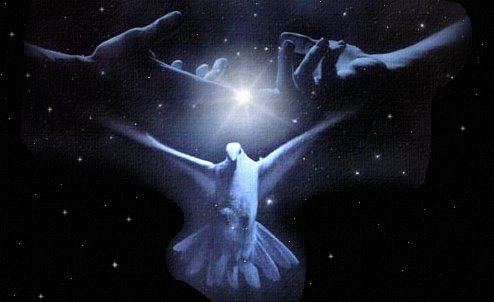|

Revelation Revealed

By the Rev. Lee Woofenden
Bridgewater,
Massachusetts, April 30, 2000
Readings

Daniel
7:13, 14 Daniel's vision of a son of man
In my
vision at night I looked, and there before me was one like a son of man,
coming with the clouds of heaven. He approached the Ancient of Days and
was led into his presence. He was given authority, glory, and sovereign
power; all peoples, nations and people of every language worshipped him.
His dominion is an everlasting dominion that will not pass away, and his
kingdom is one that will never be destroyed.

Revelation 1:9-20 John's
vision of the Son of man
I, John,
your brother who share with you in Jesus the persecution and the kingdom
and the patient endurance, was on the island called Patmos because of
the word of God and the testimony of Jesus. I was in the spirit on the
Lord's day, and I heard behind me a loud voice like a trumpet saying,
"Write in a book what you see, and send it to the seven churches:
to Ephesus, to Smyrna, to Pergamum, to Thyatira, to Sardis, to
Philadelphia, and to Laodicea."
Then I
turned to see whose voice it was that spoke to me, and on turning I saw
seven golden lampstands, and in the midst of the lampstands I saw one
like the Son of man, clothed with a long robe and with a golden sash
across his chest. His head and his hair were white as white wool, white
as snow; his eyes were like a flame of fire, his feet were like
burnished bronze, refined as in a furnace, and his voice was like the
sound of many waters. In his right hand he held seven stars, and from
his mouth came a sharp two-edged sword, and his face was like the sun
shining in its full power.
When I
saw him, I fell at his feet as though dead. But he placed his right hand
on me, saying, "Do not be afraid; I am the first and the last, and
the living one. I was dead, and see, I am alive forever and ever; and I
have the keys of Death and of Hades. Now write what you have seen, what
is, and what is to take place after this. As for the mystery of the
seven stars that you saw in my right hand, and the seven golden
lampstands: the seven stars are the angels of the seven churches, and
the seven lampstands are the seven churches.

Apocalypse Revealed, Preface The Book of Revelation explained
Many
people have sweated over the explanation of the Book of Revelation. But
since the spiritual meaning of the Bible has been unknown up to now,
they could not see the secrets that lie hidden within it. For only the
spiritual sense reveals these. Because of this, expositors have made
various conjectures, most of which have applied the things in the Book
of Revelation to the stages of various empires, mixing in various
ecclesiastical affairs.
But in
its spiritual sense, the Book of Revelation, like the whole Bible, does
not say the slightest thing about worldly affairs. Instead, it speaks of
heavenly things. So it does not speak about empires and kingdoms, but
about heaven and the church. Let it be known that after the Last
Judgment, which took place in the spiritual world in the year 1757, . . .
a new heaven was formed from Christians--but it was formed only from
those who could receive the Lord as the God of heaven and earth
(according to his words in Matthew 28:18), and who had also repented of
their evil actions while they lived in the world. From this heaven a new
church on earth, which is the New Jerusalem, is descending and will
descend. . . .
Everyone
can see that the Book of Revelation cannot possibly be explained unless
it is done by the Lord. For every word in it contains secrets that we
could never know without special enlightenment--which means revelation.
Therefore it has pleased the Lord to open my spiritual sight and teach
me. Do not believe, then, that I have taken anything in it from myself
or from any angel, because it is from the Lord alone. The Lord also said
to John through the angel:
Do not seal up the words
of the prophecy of this book. (Revelation 22:10)
This
means that these things will be explained.

Sermon
I, John,
your brother who share with you in Jesus the persecution and the kingdom
and the patient endurance, was on the island called Patmos because of
the word of God and the testimony of Jesus. I was in the spirit on the
Lord's day, and I heard behind me a loud voice like a trumpet saying,
"Write in a book what you see, and send it to the seven
churches." (Revelation 1:9-11)
Today's
sermon is an unabashed advertisement for our new Wednesday evening adult
Bible study and discussion group, which begins this Wednesday from 7:30
to 9:00. In this class, we will study the Book of Revelation in much
greater detail and depth than we have time for this morning, and we will
discuss how this powerfully enigmatic book relates to our times and to
our own individual lives.
For now,
I would like to begin opening up the Book of Revelation with the help of
Emanuel Swedenborg's unveiling of its deeper, spiritual meaning, as
shown to him by the Lord. Along the way, we'll find that this book which
looks so strange on the surface carries not only cosmic insights, but
personal meaning for our own spiritual lives.
First, it
will help to know the origin of the Book of Revelation, with its
twenty-two image-rich chapters. As our text tells us, this book was
written by the Apostle John--the same one who wrote the Gospel of John.
John's Gospel is the one that focuses especially on the Lord's great
love for us, and on the deeper, spiritual wisdom he offers to us.
John
wrote his Gospel in order to share the good news of Jesus Christ, and to
invite people to become followers of the Lord. The Book of Revelation,
however, was written to people who were already Christians. And we know
from John's introduction that it was written at a time when Christians
were being persecuted. John himself, we are told, had been exiled (by
the Roman government) to a small island called Patmos, located off the
coast of Asia Minor (modern day Turkey) because of his testimony to
Jesus.
Before
his exile, John had been the leader of the fledgling Christian church in
Ephesus, one of the seven churches in Asia Minor to which letters are
directed in the second and third chapters of Revelation. John outlived
all of the rest of the original twelve Apostles. At the time he wrote
Revelation, around 95 AD, John was about ninety years old, and the only
one of the original Apostles still living. The Romans had destroyed
Jerusalem in 70 AD, dispersing both Jews and Christians to other lands.
So it was that the early Christian Church was developing in Asia Minor
rather than in the Holy Land.
At this
time, just as John himself was suffering persecution, the seven
Christian churches in Asia Minor were suffering persecution as well. The
Book of Revelation--the last book in the New Testament to be
written--was intended to give hope and encouragement to Christians
everywhere who were being persecuted because of their faith in Jesus
Christ. Its overall message is that although the worldly events of
nations and empires may seem vast and overpowering, above it all the
Lord and Savior Jesus Christ--the same one John had known while he was
here on earth--was firmly in control, and would bring about justice upon
all oppressors, while giving salvation to those who remained faithful.
Even at
this rather literal level, the Book of Revelation can still give us
encouragement today. Which one of us has never looked around at the
world today, at the great flow of national and international events, and
felt that all these happenings that affect our livelihoods, our
families, and our communities are entirely out of our control? Which one
of us has not felt, at times, that in comparison to these great events,
we are like little ants that will be crushed under the vast forces of
our times? When we are having these kinds of thoughts, the Book of
Revelation is a good antidote. In it, all the great powers, nations, and
empires of the world are seen to be no match for the infinitely greater
power of the Lord.
Yet there
is so much more in the Book of Revelation. So much more that speaks, not
merely of worldly powers and of the affairs of governments and other
human organizations, but of the great spiritual stages of
humankind and of our own individual lives.
And it
all starts, as it should, with a vision of the risen and glorified Lord
Jesus Christ. In the Gospel accounts, which described the Lord's life on
earth, there was still room for question and doubt as to who this Jesus
was. This is due partly to the fact that people weren't ready to accept
him not merely as a great man and a prophet, but as God himself come to
earth. It is also partly due to the fact that while Jesus was living on
earth, he himself went through various spiritual stages--through ups and
downs of the spirit that went far beyond anything that any one of us
will ever experience. There were times when his spirit was cast down to
the depths, and he felt distant from God. In these times, he referred to
God as a separate being--as his Father in heaven. And there were times
when he felt very close to God, as to a being who was not separate from
him, but was his own inner soul. At these times he stated that he and
his Father were one.
When he
appears in the first chapter of the Book of Revelation, all of the
questions and doubts about his true nature have been removed. With the
resurrection, which we celebrated last week on Easter Sunday, Jesus the
Son had become fully united with God the Father, forming a single Divine
Humanity who is the one God of heaven and earth. This is why the
"Son of man" whom John encountered at the beginning of his
vision could say to him, "I am the first and the last, and the
living one. I was dead, and see, I am alive forever and ever"
(Revelation 1:17, 18).
There can
be only one being who is the first and the last. That being is the God
of the universe, who is at once Father, Son, and Holy Spirit. If we
listen to John's words and take them to heart, this glorious vision of
the Son of man can remove all doubt from our minds that the one God whom
we worship, and who holds both our lives and the fate of the world in
his hands, is none other than our personal Lord and Savior, Jesus
Christ, who lived among us on earth, was crucified, and rose again. This
is the God of the universe, who has made himself known to us both
personally and through the written Word of God.
Everything
else in the Book of Revelation--and in the entire Bible--follows from
this. The same is true of our own lives as Christians. Wherever we may
have come from, wherever we may be now, and wherever we may be going,
the only true and reliable beginning and focus that we can have for our
lives is the Lord, God, and Savior Jesus Christ. Everything in the
universe comes from him. Everything in our lives does, too. And when we
recognize this source of all being, and put our faith and hope in him,
then he can give us the wisdom and strength to face all the trials of
our lives--just as he gave wisdom and strength to those early Christians
to face persecutions greater than any of us are likely to suffer.
Yet we
still face inner persecutions--persecutions of the soul--that can be
every bit as great as the more literal and physical persecutions
suffered by the early Christians. We struggle within ourselves against
the spiritual enemies that seek to drag us down and destroy our lives.
The Book of Revelation, in its spiritual meaning, is all about these
inner struggles--these great wars of the spirit--that every one of us
faces if we are spiritually alive and growing. It is all about how we
can prevail over those deeper enemies with the Lord's help.
We do not
have time this morning to go into the details of who and what these
enemies are, how the Lord fights against them for us, and how we will
prevail over them through his power if we remain steady in our faith and
devotion to him to the end of our lives. If you want to go more deeply
into these fascinating and life-changing issues, I invite you to join us
this Wednesday evening for the first of our Bible studies. Meanwhile, we
can get an overall sense of the great spiritual issues involved in the
Book of Revelation.
Though
there is a confusing welter of figures that come and go throughout this
strange and wonderful book, two figures stand out as the major opponents
of Christ: the great red dragon, identified as the Devil and Satan (in
chapter 12), and the woman sitting on a scarlet beast, who is identified
with Babylon (in chapter 17). Swedenborg explains these two figures as
images of the two major ways that we human beings can go wrong: we can
go wrong in the head, and we can go wrong in the heart.
When we
go wrong in the head, we think that because of what we know, we
are better than other people. In terms of church doctrine, this comes
out as the fallacy that faith alone saves, as represented in traditional
Protestant and Evangelical doctrine. It is the idea that if we just know
the right things, believe the right things, we will be saved--regardless
of whether we actually live by them. Because of our church's
wonderfully deep and satisfying teachings, I believe we are especially
prone to this error. It is easy to think that simply because we have
been given greater understanding of the mysteries of faith, we are
somehow the special, chosen ones of the Lord.
However,
nothing that we merely know, without putting it into practice,
will make any difference in the end. For as Paul said, "It is not
the hearers of the law who are righteous in God's sight, but the doers
of the law who will be justified" (Romans 2:13). Our personal
battle with the great red dragon is against our intellectual pride and
our complacent notion that since (as we imagine) we are more enlightened
than others, we can rest on our laurels and avoid the real work of living
out our beliefs. Our teachings are clear: it is only what we put
into practice that becomes a real, eternal part of our lives and our
souls.
Going
wrong in the head is bad; but it is not as bad as going wrong in the
heart. The greatest destructiveness of which we humans are capable comes
not so much from intellectual pride as from the self-centered notion
that everyone and everything around us should bow down to our wishes and
serve us. This is the woman on the scarlet beast. In the history of the
Christian Church, Swedenborg identifies this figure with the corrupted
Roman Catholic Church during the centuries when it focused more on
establishing its worldly power over nations and individuals, and on
building up its wealth, than on providing spiritual sustenance and
enlightenment to people in spiritual need.
In our
lives, the woman on the scarlet beast that we must struggle against is
our inborn tendency to put ourselves before everyone else, and to judge
everyone around us by how well they serve our own needs. When we are in
the grip of this Babylon of the soul, we love only those who love us,
and feel coldness, disrespect, anger, and even hatred toward those who
oppose us or get in our way. Though we do not like to admit that we have
these feelings within us, our struggles against the selfish feeling that
we ourselves should rule over everything and everyone around us are the
deepest battles we face in our journey toward spiritual life.
As with
our struggles against pride and complacency, we can prevail against our
ego and selfishness only if our strength comes from a living
relationship with the Lord. By ourselves, we have no strength or power
at all. On our own, we would be crushed by these huge spiritual enemies.
The comforting message of the Book of Revelation is that if we will put
our faith in the Lord Jesus Christ, and remain constant in our efforts
to live by that faith, then whatever struggles and difficulties
we may face here on earth, in the end the Lord will prevail in our
lives. In the end, all of the terrifying and disheartening foes we face
within our own souls will be crushed before the infinitely greater power
of the Lord's love. They will fade into oblivion as the infinitely
greater light of the Lord's truth shines into our souls, banishing all
of our darkness. Amen
 

 

© Danny Hahlbohm
Painting entitled Trinity
Music:
Prism: Color of Love
©Bruce DeBoer


|